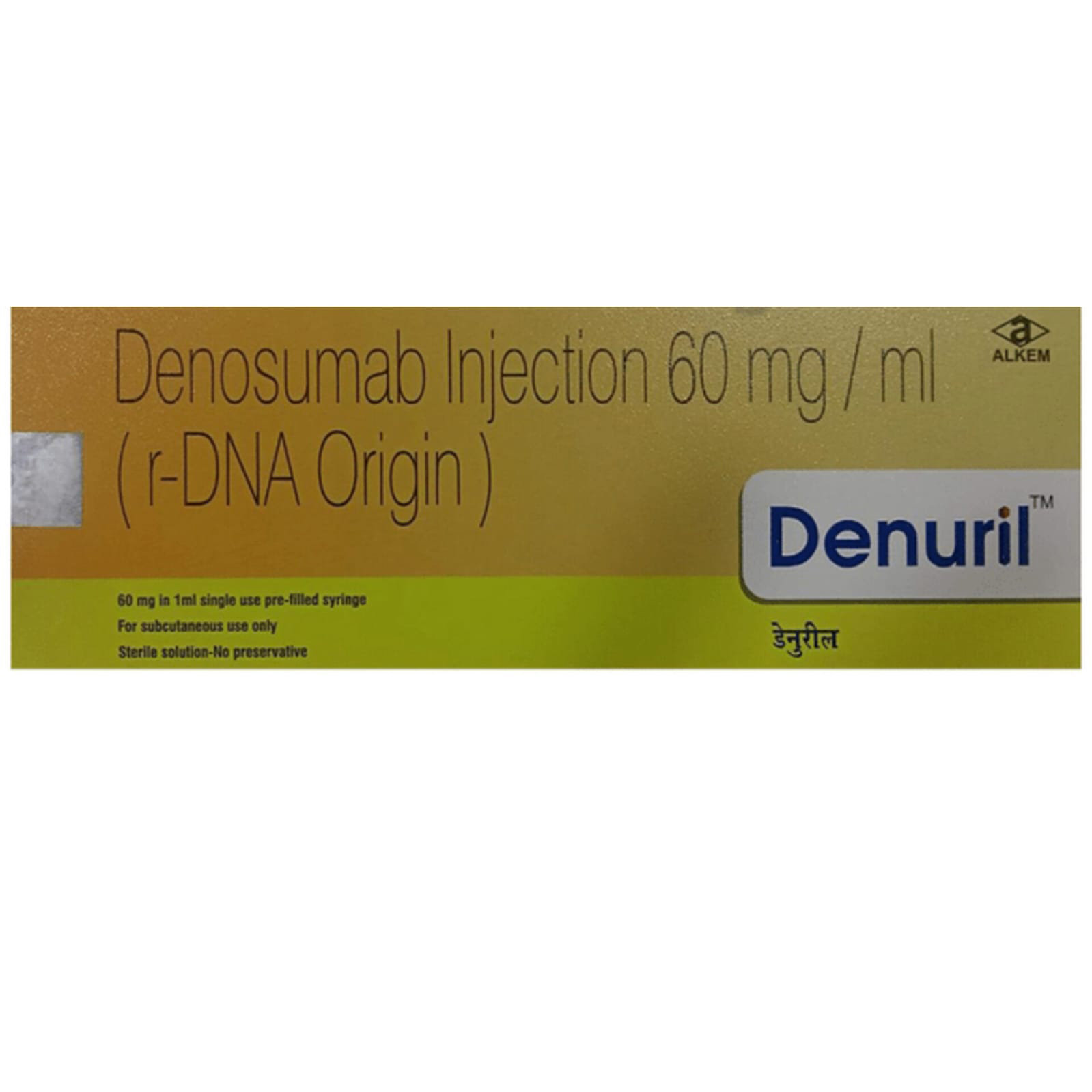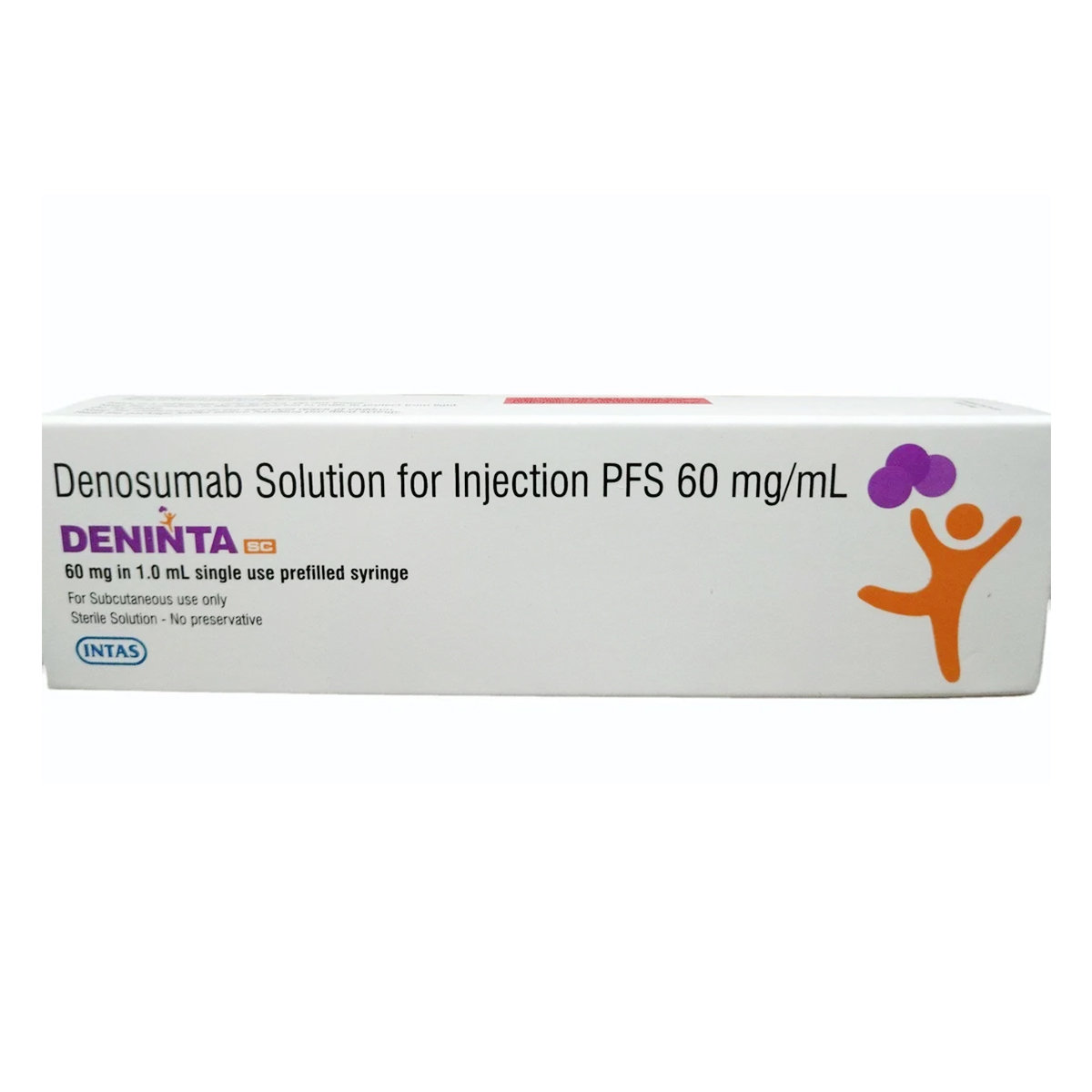Denu 60 mg Injection 1 ml
MRP ₹8085.5
(Inclusive of all Taxes)
₹808.5 Cashback (10%)
Provide Delivery Location

secured payment

india's most trusted pharmacy

genuine products
Composition :
Manufacturer/Marketer :
Consume Type :
Expires on or after :
Return Policy :
About Denu 60 mg Injection 1 ml
Denu 60 mg Injection 1 ml belongs to a group of medicines called RANK ligand inhibitors used to treat osteoporosis in postmenopausal women and men who have an increased risk of fracture. Denu 60 mg Injection 1 ml is also used to treat bone loss due to reduced testosterone level caused by surgery, due to the treatment with medicines such as glucocorticoids and in patients with prostate cancer. Denu 60 mg Injection 1 ml may also be used to reduce the risk of fractures in people with multiple myeloma, giant cell tumour of the bone, and to treat high calcium levels caused due to cancer.
Denu 60 mg Injection 1 ml contains ‘denosumab’, which works by blocking a receptor in the body that causes bone loss, thereby treats bone loss. Denu 60 mg Injection 1 ml treats giant cell tumour of bone (GCTB) by blocking certain receptors in the tumour cells, thereby slowing the tumour growth. Denu 60 mg Injection 1 ml helps treat high calcium levels by decreasing bone breakdown as a breakdown of the bones releases calcium. Denu 60 mg Injection 1 ml makes the bones stronger and less likely to break.
Denu 60 mg Injection 1 ml will be administered by a healthcare professional; do not self-administer. In some cases, you may experience common side-effects such as bone/joint/muscle pain, arm/leg pain, abdominal discomfort, constipation, and painful/frequent urination. You are advised to talk to your doctor if the side effects persist or worsen.
Denu 60 mg Injection 1 ml might cause osteonecrosis of the jaw; therefore, maintain good dental hygiene and receive regular dental check-ups whilst on treatment with Denu 60 mg Injection 1 ml. Avoid taking Denu 60 mg Injection 1 ml if you are pregnant. Consult your doctor before taking Denu 60 mg Injection 1 ml if you are breastfeeding. Denu 60 mg Injection 1 ml is not recommended for children below 18 years as safety and effectiveness have not been established. Keep your doctor informed about your health condition and medicines to rule out any interactions.
Uses of Denu 60 mg Injection 1 ml

Have a query?
Directions for Use
Key Benefits
Denu 60 mg Injection 1 ml belongs to a group of medicines called RANK ligand inhibitors used to treat osteoporosis in postmenopausal women and men who have an increased risk of fracture. Denu 60 mg Injection 1 ml is also used to treat bone loss due to reduced hormone levels caused by surgery or due to treatment with medicines in patients with prostate cancer. It is also used to treat bone loss occurring due to long-term treatment with glucocorticoids in patients who are at an increased risk of fractures. Denu 60 mg Injection 1 ml may also be used to reduce the risk of fractures in people with multiple myeloma, giant cell tumours of the bone and to treat high calcium levels caused due to cancer. Denu 60 mg Injection 1 ml binds to a protein on RANK ligand on osteoclast (cells that cause bone breakdown) and inhibits their formation, functioning and survival. Thereby decreases bone breakdown, increases bone density, and strengthens the bone. Denu 60 mg Injection 1 ml treats giant cell tumour of bone (GCTB) by blocking certain receptors in the tumour cells, thereby slows the tumour growth. Denu 60 mg Injection 1 ml helps treat high calcium levels by decreasing bone breakdown as the breakdown of the bones releases calcium. Denu 60 mg Injection 1 ml makes the bones stronger and less likely to break.
Storage
- Rest well; get enough sleep.
- Eat a balanced diet and drink enough water.
- Manage stress with yoga and meditation.
- Limit alcohol and caffeine.
- Physical activities like walking or jogging might help boost energy and make you feel less tired.
- Rest well; get enough sleep.
- Eat a balanced diet and drink enough water.
- Manage stress with yoga and meditation.
- Limit alcohol and caffeine.
- Physical activities like walking or jogging might help boost energy and make you feel less tired.
- Talk to your doctor about your back pain and potential medication substitutes or dose changes.
- Try yoga or Pilates and other mild stretching exercises to increase flexibility and strengthen your back muscles.
- To lessen the tension on your back, sit and stand upright and maintain proper posture.
- To alleviate discomfort and minimize inflammation, apply heat or cold packs to the afflicted area.
- Under your doctor's supervision, think about taking over-the-counter painkillers like acetaminophen or ibuprofen.
- Make ergonomic adjustments to your workspace and daily activities to reduce strain on your back.
- To handle tension that could make back pain worse, try stress-reduction methods like deep breathing or meditation.
- Use pillows and a supportive mattress to keep your spine in the right posture as you sleep.
- Back discomfort can worsen by bending, twisting, and heavy lifting.
- Speak with a physical therapist to create a customized training regimen to increase back strength and flexibility.
- Please inform your doctor about joint pain symptoms, as they may adjust your medication regimen or prescribe additional medications to manage symptoms.
- Your doctor may prescribe common pain relievers if necessary to treat joint discomfort.
- Maintaining a healthy lifestyle is key to relieving joint discomfort. Regular exercise, such as low-impact sports like walking, cycling, or swimming, should be combined with a well-balanced diet. Aim for 7-8 hours of sleep per night to assist your body in repairing and rebuilding tissue.
- Applying heat or cold packs to the affected joint can help reduce pain and inflammation.
- Please track when joint pain occurs and any factors that may trigger it, and share this information with your doctor to help manage symptoms.
- If your joint pain is severe or prolonged, consult a doctor to rule out any underlying disorders that may require treatment.
- Eat fatty fish rich in omega-3 fatty acids to reduce inflammation.
- Add whole grains such as brown rice, quinoa, and whole wheat bread to your diet for a nutritional boost.
- Add nuts and seeds like almonds, walnuts, chia seeds for anti-inflammatory benefits.
- Eat dark leafy greens like spinach, kale, collard greens for antioxidants.
- Include berries like blueberries, strawberries, raspberries for anti-inflammatory properties.
- Rest and take a break from usual activities.
- Apply ice for 15-20 minutes, 3 times a day to reduce pain and inflammation.
- Use compression with a stretchable bandage or wrap to lessen swelling and provide support.
- Avoid strenuous activities and rest the affected area.
- Try light stretching with gentle exercises to maintain flexibility.
- Consider OTC pain medications like ibuprofen or acetaminophen but consult a doctor before taking any medication.
- Hydrate your body: Drink enough water to prevent dehydration and headaches.
- Calm Your Mind: Deep breathing and meditation can help you relax and relieve stress.
- Rest and Recharge: Sleep for 7-8 hours to reduce headache triggers.
- Take rest: lie down in a quiet, dark environment.
- Cold or warm compresses can help reduce tension.
- Stay Upright: Maintain good posture to keep symptoms from getting worse.
- To treat headaches naturally, try acupuncture or massage therapy.
- Over-the-counter pain relievers include acetaminophen and ibuprofen.
- Prescription Assistance: Speak with your doctor about more substantial drug alternatives.
- Severe Headaches: Seek emergency medical assistance for sudden, severe headaches.
- Frequent Headaches: If you get reoccurring headaches, consult your doctor.
- Headaches with Symptoms: Seek medical attention if your headaches include fever, disorientation, or weakness.
- Tell your doctor about the cough symptoms you're experiencing, which may be triggered by your medication.
- Your doctor may adjust your treatment plan by changing your medication, adding new medications, or providing guidance on managing your cough symptoms.
- Practice good hygiene, including frequent handwashing, avoiding close contact with others, and avoiding sharing utensils or personal items.
- Stay hydrated by drinking plenty of fluids, such as water, tea, or soup, to help thin out mucus and soothe your throat.
- Get plenty of rest and engage in stress-reducing activities to help your body recover. If your cough persists or worsens, consult your doctor for further guidance.
Drug Warnings
Do not take Denu 60 mg Injection 1 ml if you are allergic to any of its components; if you have hypocalcaemia (low levels of calcium in the blood). Inform your doctor if you have low levels of calcium, kidney dysfunction, liver problems, poor dental health, gum problems, weak immune system, hypoparathyroidism (decreased function of the parathyroid gland), malabsorption, latex allergy, undergone thyroid surgery, planned dental procedure, if you are taking glucocorticoids, or cannot take calcium and vitamin D supplements. Avoid taking Denu 60 mg Injection 1 ml if you are pregnant. Consult your doctor if you are breastfeeding. Denu 60 mg Injection 1 ml is not recommended for children below 18 years as safety and effectiveness have not been established.
Drug-Drug Interactions
Drug-Drug Interactions
Login/Sign Up
Using Denu 60 mg Injection 1 ml together with etelcalcetide may significantly decrease the calcium levels in your blood.
How to manage the interaction:
Taking Denu 60 mg Injection 1 ml with Etelcalcetide together can possibly result in an interaction, but it can be taken if your doctor has advised it. "When taking Denu 60 mg Injection 1 ml with medications like cinacalcet and etelcalcetide, it's important to be cautious and regularly check your blood calcium levels. If you notice any symptoms like low blood calcium, numbness, tingling around your mouth, irritability, or feeling down, make sure to contact your doctor right away." Do not stop using any medications without first talking to your doctor.
Using cladribine together with Denu 60 mg Injection 1 ml may increase the risk of infections.
How to manage the interaction:
Although there is a possible interaction between Denu 60 mg Injection 1 ml and Cladribine, you can take these medicines together if prescribed by your doctor. If you have any of the symptoms like infection, fever, chills, diarrhea, sore throat, muscle aches, difficulty breathing, and pain or burning when you urinate, consult a doctor. Do not stop using any medications without a doctor's advice.
Drug-Food Interactions
Drug-Food Interactions
Login/Sign Up
Diet & Lifestyle Advise
- Include dairy products like milk, yoghurt, cheese, or milk-based custard in your diet.
- Eat daily a serving of broccoli, cabbage, bok choy (Chinese white cabbage), spinach, and other green leafy vegetables.
- Snack on calcium-rich nuts like Brazil nuts or almonds.
- Sprinkle sesame seeds over your food, vegetables, and salads. Sesame seeds are high in calcium.
- Avoid or reduce the intake of caffeine, soft drinks, and alcohol as they may inhibit calcium absorption.
- Replace the meat with tofu or tempeh for extra calcium in your food.
Habit Forming
Therapeutic Class
All Substitutes & Brand Comparisons
RX
Denuril 60 mg Injection 1's
Alkem Laboratories Ltd
₹8085.5
(₹6630.1 per unit)
8% CHEAPERRX
Denub 60 mg Injection 1 ml
Alkem Laboratories Ltd
₹8085.5
(₹6630.1/ 1ml)
8% CHEAPERRX
Deninta SC 60mg Injection 1 ml
Intas Pharmaceuticals Ltd
₹14053
(₹11523.5/ 1ml)
58% COSTLIER
Alcohol
Safe if prescribed
It is not known if alcohol interacts with Denu 60 mg Injection 1 ml, so please consult a doctor.
Pregnancy
Consult your doctor
Denu 60 mg Injection 1 ml is not recommended during pregnancy as it might cause foetal harm. If you are a woman of child-bearing potential, use effective contraception during the treatment with Denu 60 mg Injection 1 ml and for 5 months after discontinuation. Inform your doctor if you are pregnant, think you are pregnant or planning for pregnancy.
Breast Feeding
Consult your doctor
Consult your doctor if you are breastfeeding; your doctor will decide if breastfeeding mothers can take Denu 60 mg Injection 1 ml or not.
Driving
Safe if prescribed
Denu 60 mg Injection 1 ml generally does not affect your ability to drive. However, drive or operate machinery only if you are alert.
Liver
Consult your doctor
Please consult your doctor if you have a liver impairment or any concerns regarding this.
Kidney
Consult your doctor
Please consult your doctor if you have kidney impairment or any concerns regarding this.
Children
Safe if prescribed
Denu 60 mg Injection 1 ml is not recommended for children below 18 years as safety and effectiveness were not established.
FAQs
Denu 60 mg Injection 1 ml binds to a protein on RANK ligand on osteoclast (cells that cause bone breakdown) and inhibits their formation, functioning and survival. Thereby decreases bone breakdown, increases bone density, and strengthens the bone. Denu 60 mg Injection 1 ml makes the bones stronger and less likely to break.
Osteonecrosis of the jaw (bone damage in the jaw) might be a side-effect of Denu 60 mg Injection 1 ml. The risk increases in people taking Denu 60 mg Injection 1 ml for longer durations. It might also occur upon discontinuation of the treatment. Maintain good dental hygiene and receive regular dental check-ups whilst on treatment with Denu 60 mg Injection 1 ml. Inform your doctor if you have dental problems, gum disease, planned tooth extractions, cancer, if you smoke, or are taking bisphosphonates or corticosteroids.
Breakdown of bones releases calcium and causes hypercalcemia (high calcium levels in the blood). Denu 60 mg Injection 1 ml helps treat high calcium levels by decreasing bone breakdown.
Unusual thigh bone fractures might occur whilst on treatment with Denu 60 mg Injection 1 ml. Consult your doctor if you experience new or unusual pain in the thigh, hip, or groin.
Denu 60 mg Injection 1 ml treats giant cell tumour of bone (GCTB) by blocking certain receptors in the tumour cells, thereby slows the tumour growth. Giant cell tumour of the bone is a non-cancerous tumour that typically grows at the ends of long bones.
Denu 60 mg Injection 1 ml might cause skin infections. Consult your doctor immediately if you notice symptoms such as swollen skin, redness, cellulitis (hot and tender skin), commonly in the lower leg with feverish symptoms.
Country of origin
Manufacturer/Marketer address
Disclaimer
Keep Refrigerated. Do not freeze.Prepaid payment required.
Author Details
We provide you with authentic, trustworthy and relevant information







_0.jpg?tr=q-85)

